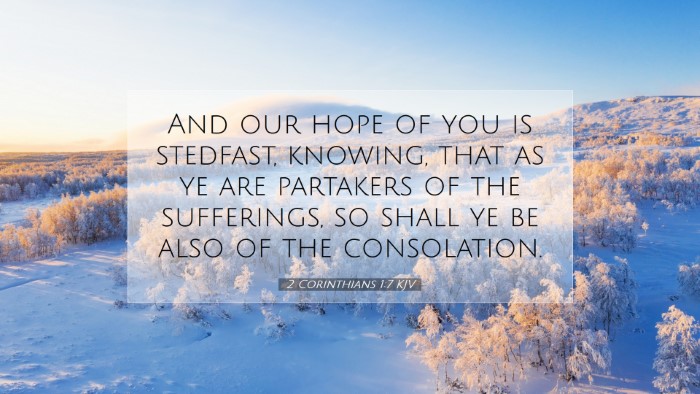Commentary on 2 Corinthians 1:7
Verse: “And our hope for you is steadfast, knowing that as you are partakers of the sufferings, so shall you be also of the consolation.” (2 Corinthians 1:7, KJV)
Introduction
This verse comes from the opening chapter of Paul's second letter to the Corinthians, where he expresses his deep concern for the believers in the context of suffering and comfort. In this commentary, we draw insights from notable public domain theologians including Matthew Henry, Albert Barnes, and Adam Clarke to glean a richer understanding of this potent text.
Contextual Overview
In 2 Corinthians, Paul defends his apostleship while addressing the challenges faced by the church, including false teachers and internal strife. The overarching theme is the suffering endured for the Gospel and the divine comfort that accompanies that suffering. Paul praises God, the source of all comfort, which becomes relevant when discussing hope in the midst of trials.
Exegesis of the Verse
“And our hope for you is steadfast”
- Steadfast Hope: Paul expresses confidence in the perseverance of the believers; his hope is not fleeting but firmly grounded in Christ. Matthew Henry notes that hope must be anchored in God's promises, especially in times of adversity.
“knowing that as you are partakers of the sufferings”
- Participation in Sufferings: The apostle emphasizes a shared experience of trials common to all believers. Albert Barnes explains that suffering is a significant part of Christian life, reflecting Christ's own sufferings and, hence, the validation of their faith.
- Communal Aspect: Paul highlights the unity of believers in suffering. Adam Clarke points out that shared sufferings strengthen the bonds of community and lead to a deeper understanding of God's work in their lives.
“so shall you be also of the consolation”
- Divine Comfort: The promise of consolation reinforces that their suffering is not in vain. Henry elaborates that God’s consolation is proportionate to the afflictions endured. This concept resonates deeply as it assures believers of God's presence in their hardships.
- Encouragement for Ministry: Paul’s encouragement acts as a reminder that the ministry of comfort belongs to believers. Barnes reflects on how believers can in turn comfort others, having experienced God's comfort themselves.
Theological Implications
This verse embodies the theology of suffering and comfort in Christianity. It highlights several core beliefs:
- Suffering as a Part of Christian Experience: It acknowledges that suffering is an inevitable aspect of faith. Both Henry and Clarke argue that to follow Christ means embracing both His sufferings and His comforts.
- Hope and Assurance: Believers can maintain hope amid suffering, knowing that God’s comfort follows trials. This reinforces the concept of resilience in faith, a theme reiterated by Barnes.
- Nature of God’s Comfort: God is portrayed as a source of unceasing comfort. By focusing on the nature of God, Paul encourages the church to look beyond their immediate circumstances to the eternal comfort awaiting them.
Application for Today’s Church
In today's world, where many face tribulations—be it through persecution, personal loss, or societal pressures—this verse offers profound assurance. Pastors and leaders are encouraged to:
- Encourage Shared Suffering: Recognize that communal struggles can foster deeper connections and collective strength amongst congregants, echoing Paul’s example.
- Emphasize Hope: Actively communicate hope derived from Christ, ensuring believers understand their sufferings are part of a larger redemptive story.
- Foster Comforting Ministries: Equip the church to be conduits of God’s comfort, affirming that as they receive comfort, they are called to extend it to others.
Conclusion
2 Corinthians 1:7 serves as a cherished reminder of the dual realities of suffering and comfort. Paul’s steadfast hope for the Corinthians resonates through the ages, affirming that just as they will partake in the sufferings of Christ, they will also experience the overflowing consolation that God provides. This passage reinforces the rich tapestry of Christian hope that sustains believers even in their darkest hours, calling them to share in one another's sufferings, trusting in God's faithful comfort.


